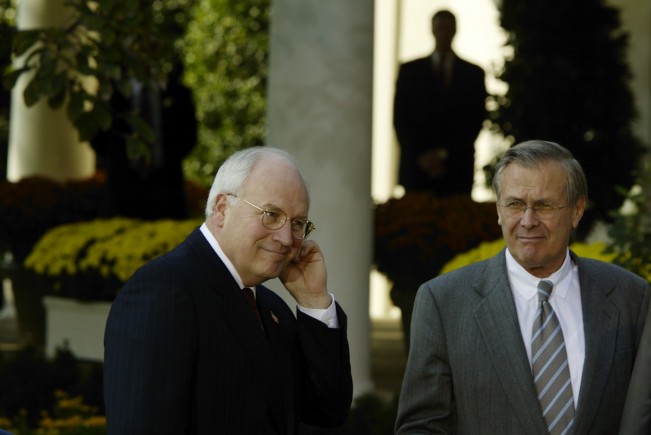

By Ray Pride Pride@moviecitynews.com
Sundance Review: The World According To Dick Cheney, After Tiller
The first film I saw at Sundance 2013 was a bitter note, a reckless, infuriating piece of work for Showtime, The World According to Dick Cheney, a credulous, shallow, near-hagiography of the former vice president’s decades-long political scheming and proud lying. Built around four days of interviews, Cheney, in this incarnation—the filmmakers say they have the DVD extras to enhance the historical record where the film does not—is told from his perspective. The first hour, narrated by Dennis Haysbert (“24”) with all the gravitas of a quick day session, suggests that Cheney’s entire life was willed, as if a fated life narrative were unfolding before us. Cheney is decisive. Cheney rises above being thrown out of Yale and multiple drunk-driving arrests to become Cheney. Cheney was fated to be Cheney. That’s the level of background provided.
The film is fixed on the force of his crude personality and drive to power. The cut-rate melodramatic score is most pronounced during Cheney’s braggadocio about 9/11, and accompanied by a grab bag of archival footage, endorses his perspective, whether intentionally or not. The very fabric of the filmmaking seems to underline and endorse his every pronunciamento. Turning to wars, the film quickly becomes “Zero Dick Thirty.” Decisiveness! Forget the law! Forget treaties! Cheney is also reprehensible in its innocuousness: reverence toward an elected official turns into something beneath the sorry level of contemporary network news-gathering. While there are terse sound bites from journalists (all of whom are lit to look as geeky as possible), the key interview, done by the filmmakers, is on the level of David Gregory or Oprah, with as many follow-up questions as on a Sunday morning conventional wisdom show. (One? Two? I don’t think it goes higher than that.) It’s even weaker tea than when network interlocutors steep in the proximity of power or vast wealth. (Coincidentally, the film premiered at the same time Oprah’s suddenly visible cable channel offered Lance Armstrong and Oprah a chance to cry a river over the phony athlete’s lost endorsement tens of millions.) No mention of Cheney’s military record, no mention of the Halliburton financial deal that enriched him even into the vice-presidential mansion. All you’re left with is unique access. Four hours of my time to broker platitudes about a lifetime of being closed-off and controlling: what will you do for me, Showtime? We see the answer Cheney got to that question. His bright-eyed grimace when he offers smug, superior, dismissive, clunkily-formed, unfunny one-liners, is the failed film’s high point. Or, perhaps, its only point. Did I mention that Dick Cheney single-handedly saved America and we ought to be grateful for all his fateful acts? History awaits a skeptical portrait.
The next film, a documentary, made for a schizophrenic double feature: the tender, melancholy yet emphatic observational doc, Martha Shane and Lana Wilson’s After Tiller, which follows the work done by the last four doctors who perform third-trimester abortions in this country, all who knew or worked with murdered doctor George Tiller, who was gunned down in a Kansas church in 2009. In its quiet way, it’s an advocacy doc to uphold the law of the land: despite a crazy quilt of state regulations, what they do is legal under federal law. The providers discuss the implications of the acts they perform and the reasons several have continued far past retirement age in their calling. (It’s bracing to hear the word “terrorist” correctly applied to acts of intimidation that include murder and firebombing.) The position of the filmmakers is never in doubt, but in detailing the daily choices, acts, and emotions, Shane and Wilson have made an assured, incisive humanistic nonfiction film to admire.

















I don’t find a film supports Dick Cheney’s worldview to be a valid artistic criticism. Whatever, you think of him the man does have a life story well worthy of a documentary and this review does very little to convey whether or not the documentary was worthy of that story. Also, I have to seriously wonder how often you’ve seen Mr. Gregory or if you just glibly assume that network news shows cater to the lowest common denominator.